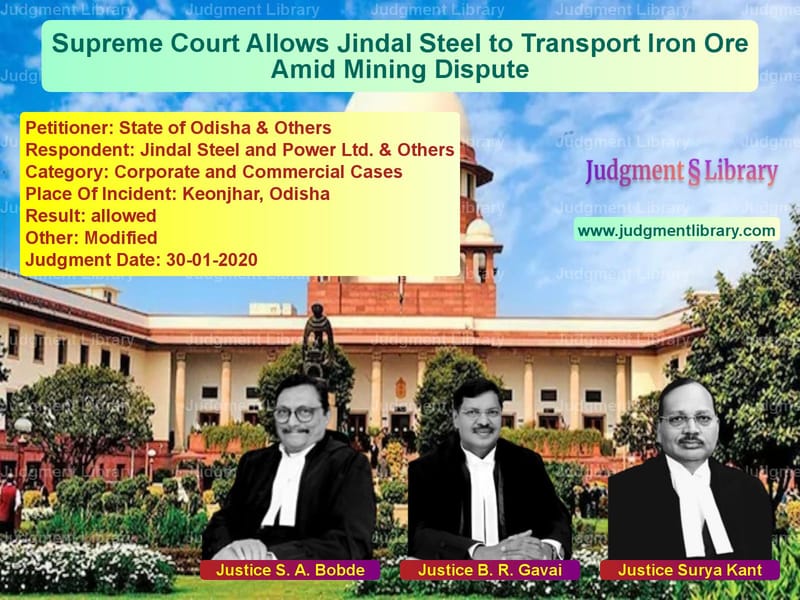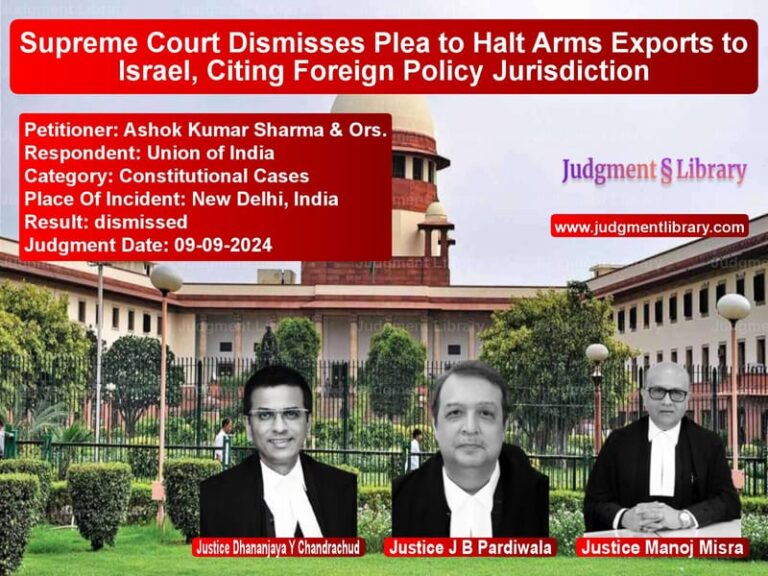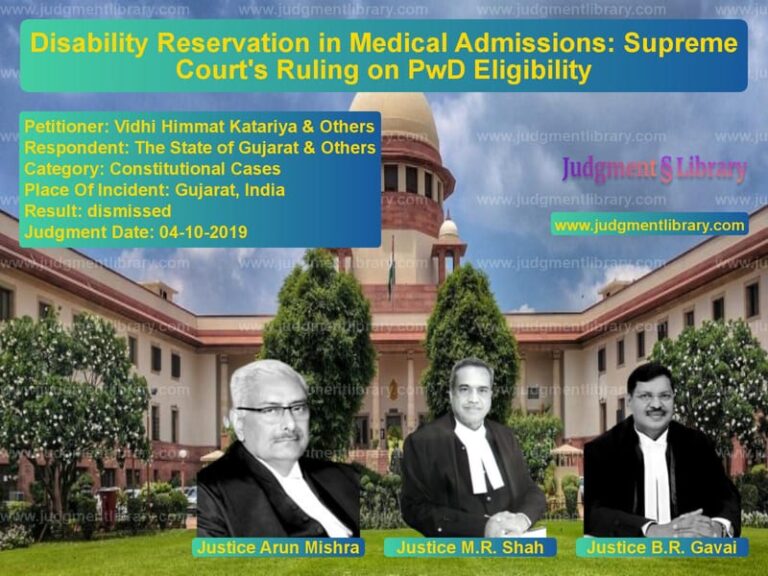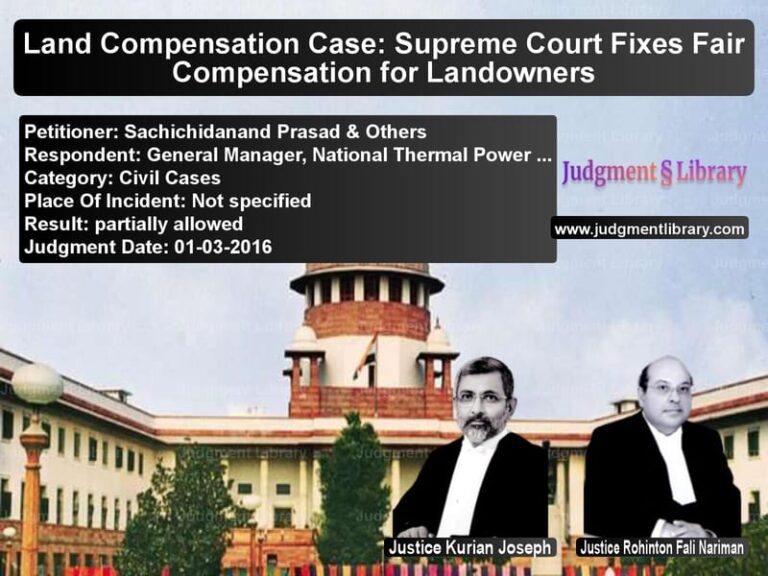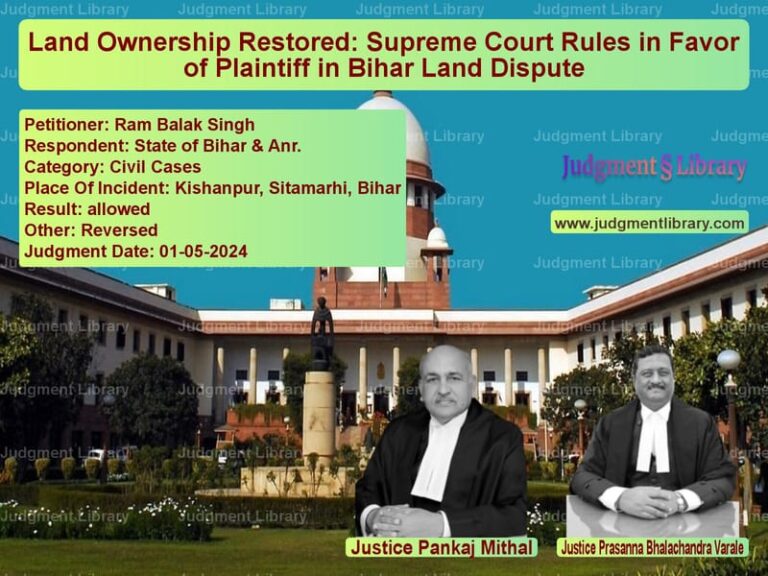Supreme Court Allows Jindal Steel to Transport Iron Ore Amid Mining Dispute
The case of State of Odisha & Others vs. Jindal Steel and Power Ltd. & Others was a crucial legal battle concerning the transportation of iron ore in Odisha. The Supreme Court had to decide whether Jindal Steel and Power Ltd. (JSPL) could be permitted to transport legally procured iron ore from Sarda Mines Pvt. Ltd. (SMPL) amid disputes over environmental clearances and mining regulations.
This case raised fundamental legal questions regarding the scope of mining operations, environmental compliance, and the rights of private entities to transport minerals. The ruling has significant implications for the mining and steel industries, as well as for regulatory authorities overseeing mineral extraction and transportation.
Background of the Case
JSPL is a leading industrial entity operating steel production plants across India. The company regularly purchases iron ore as a raw material for its operations. It had entered into an arrangement with SMPL to procure iron ore, which was to be processed and transported to JSPL’s steel plants in Odisha and Chhattisgarh.
SMPL operated mining activities at Thakurani B-Block Mines in Keonjhar, Odisha. The arrangement allowed JSPL to take possession of iron ore stocks within SMPL’s leasehold area, process them, and transport them for further use in its steel plants. However, in 2014, the Odisha government halted JSPL’s transportation of iron ore, citing the expiry of SMPL’s environmental clearance.
Government’s Action
On March 31, 2014, the Deputy Director of Mines, Joda (Keonjhar), issued a letter highlighting that SMPL’s environmental clearance had expired. As a result, the government refused to grant transit permits to JSPL for transporting the processed iron ore from the dispatch point.
JSPL argued that it had already purchased and processed the ore, paid all necessary royalties, and therefore had a legitimate right to transport it. The company made multiple representations to state authorities requesting permission to transport the ore, but its requests were denied. The Director of Mines contended that since the ore was stored within SMPL’s leasehold area, its transportation would be considered part of mining operations, which could not proceed without valid statutory clearances.
Arguments by the Petitioner
The State of Odisha, as the appellant, made the following arguments:
- Mining operations include transportation of minerals within the leasehold area. Since SMPL’s environmental clearance had expired, all associated activities, including transportation, must cease.
- JSPL’s right to the iron ore could not be superior to SMPL’s title. If SMPL was barred from mining due to lack of clearance, JSPL could not claim an independent right to transport the ore.
- The Odisha High Court erred in ruling that transportation of minerals does not constitute mining operations.
- Granting JSPL permission to transport ore without valid mining clearances could set a dangerous precedent, allowing companies to bypass environmental regulations.
- Some of the ore in question was allegedly extracted beyond the permitted limit, making its ownership legally questionable.
Arguments by the Respondent
JSPL countered the government’s claims with the following arguments:
- The company was not seeking permission to extract minerals but only to transport ore that had already been mined, processed, and royalty paid.
- Under the Mines and Minerals (Development & Regulation) Act, 1957 (MMRDA), ‘mining operations’ refer to the process of extracting minerals, not transporting already mined ore.
- JSPL had legally procured the ore before the expiry of SMPL’s environmental clearance and, therefore, had an independent right to transport it.
- The Odisha government had permitted the transportation of minerals in similar cases but was selectively denying JSPL’s request.
- Under Rule 31(1) of the Mineral Concession Rules, 1960, lifting and transportation of minerals are allowed for up to six months after the expiry of a mining lease.
Odisha High Court Ruling
The Odisha High Court ruled in favor of JSPL, stating:
- Transportation of minerals already mined and processed is not part of ‘mining operations’ under the MMRDA.
- SMPL had obtained environmental clearance for its operations, and the iron ore in question had been legally procured before its expiry.
- The government’s refusal to grant transport permits was arbitrary and unjustified.
- JSPL had paid all royalties and taxes, establishing its right over the minerals.
- Stopping JSPL from transporting the ore would amount to a violation of its business rights.
Supreme Court Judgment
The Supreme Court upheld the High Court’s decision, allowing JSPL to transport the iron ore. The Court emphasized the following key points:
“The expression ‘mining operations’ under Section 3(d) of the MMRDA refers to the winning of minerals, and not the subsequent transportation of minerals already extracted. The interpretation adopted by the High Court is legally sound.”
The Supreme Court’s ruling included the following directives:
- JSPL was permitted to transport the legally procured and royalty-paid iron ore from SMPL’s leasehold area to its steel plants.
- The transportation must be completed under strict regulatory oversight to prevent any misuse.
- SMPL must comply with all environmental regulations and settle any outstanding dues.
- The proceeds from the transportation must be deposited in a Trust & Retention Account under the custody of the State Bank of India.
- If SMPL or JSPL failed to comply with these conditions, any further sale or transport of the ore would be deemed legally void.
Legal Precedents Considered
The Supreme Court referred to several key rulings:
- The Bihar Mines Ltd. vs. Union of India – Defined ‘mining operations’ as activities necessary to extract minerals.
- Samaj Parivartana Samudaya vs. State of Karnataka – Clarified regulatory oversight in mining operations.
- Common Cause vs. Union of India – Addressed illegal mining practices and environmental compliance.
Final Outcome
The Supreme Court’s decision provided much-needed clarity on the legal distinction between mining operations and mineral transportation. The ruling ensured that JSPL could transport its legally procured iron ore while maintaining regulatory oversight. The verdict also reinforced the importance of environmental compliance and regulatory approvals in the mining sector.
This case serves as a crucial precedent in India’s mining and steel industries, balancing business interests with legal and environmental safeguards.
Petitioner Name: State of Odisha & Others.Respondent Name: Jindal Steel and Power Ltd. & Others.Judgment By: Justice S. A. Bobde, Justice B. R. Gavai, Justice Surya Kant.Place Of Incident: Keonjhar, Odisha.Judgment Date: 30-01-2020.
Don’t miss out on the full details! Download the complete judgment in PDF format below and gain valuable insights instantly!
Download Judgment: State of Odisha & Ot vs Jindal Steel and Pow Supreme Court of India Judgment Dated 30-01-2020.pdf
Direct Downlaod Judgment: Direct downlaod this Judgment
See all petitions in Company Law
See all petitions in unfair trade practices
See all petitions in Corporate Compliance
See all petitions in Judgment by S. A. Bobde
See all petitions in Judgment by B R Gavai
See all petitions in Judgment by Surya Kant
See all petitions in allowed
See all petitions in Modified
See all petitions in supreme court of India judgments January 2020
See all petitions in 2020 judgments
See all posts in Corporate and Commercial Cases Category
See all allowed petitions in Corporate and Commercial Cases Category
See all Dismissed petitions in Corporate and Commercial Cases Category
See all partially allowed petitions in Corporate and Commercial Cases Category

